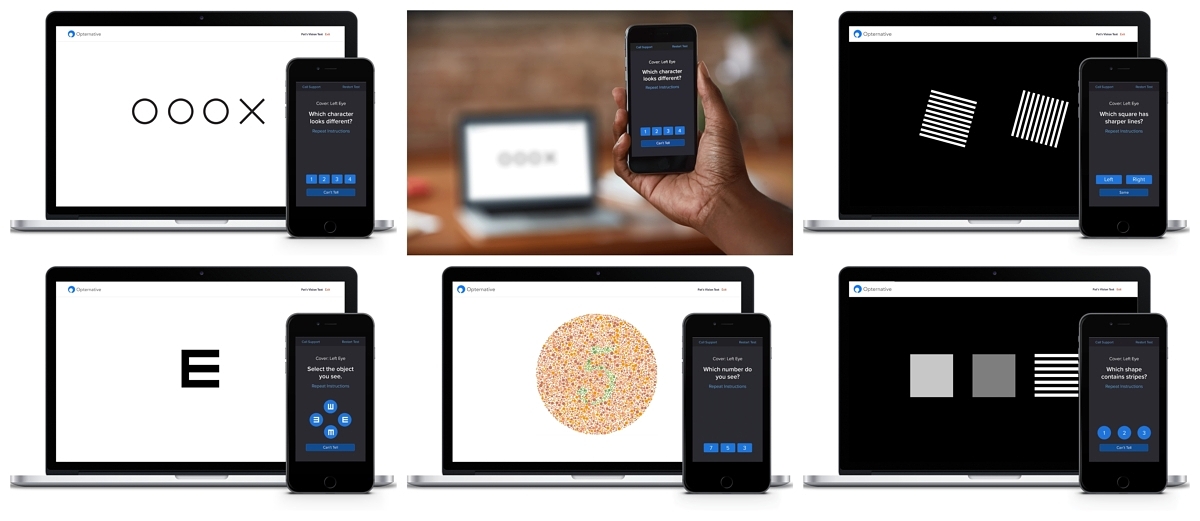Glasses and contact lens prescriptions are generally valid for one to two years depending on the state while the federal Fairness to Contact Lens Consumer’s Act has set one year as the expiration. This means that to get a new pair of glasses or lenses beyond that one year, users will have to get another prescription from their optometrist or an ophthalmologist. This can be time consuming, requiring scheduling, waiting and even skipping work just to get tested for a few minutes. Opternative, a Chicago based telehealth startup, has developed an online vision test (refractive eye exam) for user to test their vision and obtain prescriptions from board certified ophthalmologists without having to leave the comfort of their home.

Dr. Steven Lee (L), Co-Founder & CSO, and Brent Rasmussen (R), CEO, Opternative. Photo credit: Opternative website)
The Origin
Opternative was co-founded in 2012 by Dr. Steven Lee (Chief Science Office) and Aaron Dallek*. One of Dr. Lee’s patients in 2009 needed regular vision checks to track changes in prescription. Because of scheduling challenges, she would go months without a visit. When she finally made it to an appointment having skipped work, she asked him a simple question that set him off on a course to find a solution, ‘why can’t we do eye exams at home?’. After years of developing and testing the platform, Opternative got its first paid customer in 2013.
Opternative Testing
Opternative has two versions of its online test – a dual device (computer and smartphone) test as well as a recently launched mobile based test. These tests are to get prescriptions for either glasses or contact ($35), or both ($50).
The test is fairly simple and takes about 15 minutes to complete. After signing up, the user selects the vision test required (contacts/glasses/both). Interestingly, the user also has to fill in his/her shoe size in order to calculate the number of heel-to-toe steps that would be required to ensure the user is standing 10 feet away from the screen while taking the test.
Upon registering, the patient receives a text message with a link that opens up in the mobile browser. The way the test works is that images are shown on the computer screen and the responses are fed into the browser tab open on the phone by selecting the relevant option. The patient is tested on parameters such as color vision, acuity, blur screening and astigmatism. A patient can restart the test from the beginning at any point during the test.

Images of the dual device test. Photo credit: Opternative website
Having finished the test, the patient fills in their medical profile and provides a copy of their previous prescription. Once this is done, the test data is sent to a board certified ophthalmologist in the same state for review. Based on the test data, the ophthalmologist can either write a prescription, not write a prescription or require a retest to be taken. The patient then gets the results of the review and a prescription within 24 hours of taking the test. The prescription is provided via a HIPAA compliant platform ensuring patient privacy and security of information. These prescriptions can be used anywhere to obtain a pair of glasses or lenses. If users are dissatisfied, they could retake the test or get their money back.
Taking the test a notch higher, Opternative recently launched a web-based, conversational test accessible on the mobile browser.

Opternative’s new mobile based test. Photo credit: Opternative website
While everyone can take the test, it isn’t for everyone. There are four criteria which can disqualify a patient from getting a prescription – age, medical history, vision and location. The test is for the 18-55 age group, who do not have any medical conditions that impact vision (such as glaucoma, retinal detachment, cataracts, brain injuries, diabetes, amblyopia and hypertension among others). If there are any major changes in vision or should the patient’s prescription range fall beyond Opternative’s defined range, the patient would be disqualified from the test. Finally, Opternative only caters to patients in 37 states due to state laws and regulations surrounding healthcare technology.
Opternative has inbuilt systems to protect against patient response errors during the test. If the abnormalities in responses are significant enough to impact test results, the patient may have to retake the test.
The Year In Review
In 2018, apart from its new mobile based test, Opternative has had a new entry in its leadership with former CareerBuilder President Brent Rasmussen joining as the CEO. Earlier this month, Opternative raised $9M in series B funding led by Trust Ventures and Pritzker Group Venture Capital, with participation from Jump Capital. This comes two and half years after its $6M series A round in 2016.
Opternative has also been rapidly expanding domestically and globally with partnerships. Partnership with Ben & Frank in Mexico marks Opternative’s first international expansion. Opternative is in advanced stages with partners across Europe, New Zealand and South Africa. Domestically, Opternative has partnered with Privé Revaux, Liingo Eyewear, LD Vision Group, WebEyeCare.com, FrameGenie.com, Lensabl, 1-800 Contacts and Lens.com among others. Fees generated through the tests resulting from these partnerships have become the major revenue source for Opternative.
In line with their vision to work with eye care professionals in the industry and improve professional-patient relationship, Opternative has launched a professional offering called EZRx that allows professionals to offer digital refraction and visual acuity tests on their own websites. The offering can be used as a standalone service or in conjunction with traditional eye exams. Opternative also has a freely accessible ‘Find a Doctor’ feature available on its website to help connect patients with doctors in any desired locality.
Since its first paid customer in 2013, Opternative has come a long way having successfully issued hundreds of thousands of prescriptions to over 1 million patients. Opternative currently has 32 patents and patent applications in the US and overseas.

Team Opternative. Photo credit: Opternative website
The Landscape
With over 88 million refractive eye exams a year and 198 million vision correction population, the need for prescriptions in the US market is significant. An estimated 45 million people in the U.S. wear contact lenses, requiring an equivalent number of annual (or once in two years) prescriptions to get a new batch of lenses. With each exam costing between $50 and $250, the annual patient spending runs into billions of dollars.
While Opternative was the first, others have emerged in the online vision test space with their own versions and approaches to online vision tests. GlassesUSA has come out with a free app called Prescription Scanner that works on scanning the glasses. Simple Contacts has an online test focused only on contact lenses. Warby Parker has an online vision exam via its app called Prescription Check. Opternative is embroiled in a legal battle with Warby Parker where Opternative has alleged that the latter has breached the non-disclosure signed between the two by using the confidential information shared to develop and patent its own online test offering – Prescription Check.
While online refraction tests are one way of addressing the prescription challenge, EyeQue, EyeNetra and Smart Vision Labs are combining hardware and software to facilitate testing. EyeNetra and Smart Vision Labs are focused on commercial application while EyeQue has developed the Personal Vision Tracker and Insight suitable for personal and home use.
There has been a mixed response to online vision tests from the industry with pushback from certain segments of the industry. While the American Academy of Ophthalmology has been more open and supportive, the American Optometric Association has been firmly against online tests questioning the accuracy of these tests and stating that these tests are not substitutes to comprehensive eye health examinations.
Opternative only provides an online vision test to measure how well a patient sees with an objective of helping patients obtain a prescription to get their contacts/glasses. Opternative has reiterated on its website and agreements that its vision test is not a substitute for a comprehensive eye health examination.
*no longer associated with Opternative
Subscribe to our newsletter



